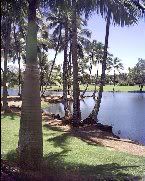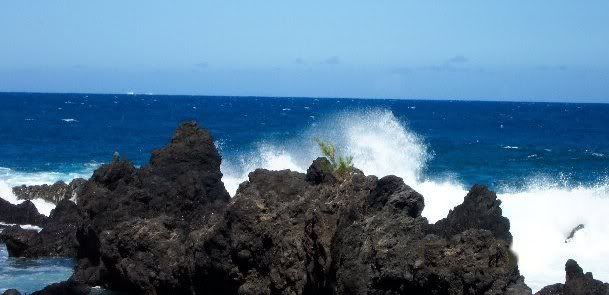

Name~ Hokule'a Kealoha
Short Bio~Hokule'a Kealoha is the Nom De Plume of a writer that formerly lived in Hawaii and is now living a life of adventure on the highways and byways of the American South . I am a Born Again follower of Jesus, as well as a wife, mother of cats and dogs,jeweler, entreprenuer, photographer and pilgrim...
Age~ Old enough to know better
Status~ Newly Single after 13 years of marriage,fur mom to the loving and devoted mini ShihTzu doggie Annabelle, born 6-11-2007 RIP 2-25-09, and the beautiful Abigail born 2-14-09
Hair Color~ natural brown/grey
Mood~ I ALWAYS have a mood, try me...
Loving~ Jesus, Hawaii, my furry friend, Abigail, my Pen Pals, Jewelry ,Blogging ,Writing anything,my Ipod,and being outdoors surrounded by my wonderful natural surroundings
Hating~ Boom Box Cars, Earspray, Abuse of Power,
Reading~
Bible
Magnificat
Link
Link
Underwired! Louisville's magazine for Women
In Store~The Magazine for the American Jeweler
Books in Progress...
CATECHISM OF THE CATHOLIC CHURCH
"Link"
"Link"
Just Finished Reading
"Link"
Link
Link
Link
Jesus, Divine Mercy ~

I Trust In You~
My Favorite Past Posts~Relive The Journey!~
2009~
Link
Link
Link
Link
Link
Link
Link
Link
2008~
Be Thankful
Colateral Damage
Make Lemonade
Home Is Where The Heart Is
The Poor With Us
Because Its The Hardest Thing I Can Do
We Have All Become Victims
Lest I Forget
The Most Important Words
Family Values
Familiar Places
May Perpetual Light Shine On Them
A City In Motion
2007~
The Quiet Storm
Fellowship of the Cane
Like Dead Unremembered: A 9-11 Tribute
The Medicine Machine
One Giant Leap
In The Steps of St. Francis
Too Much Information
The Un Choice
2006~
The Holly and the Ivy
The First 9-11, Dec 7,1941
Small Moments of Silence
Peaches to Winnipeg
Dreaming of Hawaii
Memorial Day
Scattered Values
The White Line is the Lifeline for the Nation
Warnings of a New Civil War
I Will Be True To The Promise I Have Made
The Snowy Bloody Day
Cats in the Cradle
2005~
The Journey
Rebirth of a City
For Posterity's Sake
The New Civil War
Every Mother's Son
And There You Stayed, Temporarily Lost at Sea
The Lone Rider
The Bible Is Not the Fourth Member of the Trinity
Rome Wasn't Built With Union Labor
Happy Birthday Mom ~revised~
A Beautiful Noise
Even Now
The Wearing of the Red
Night Ranger
The Joyful Traveler
Hoiliili "To Gather Up"
Ke Makakilo (My Observations)
He Giveth Sleep
Save The Children
2004~
Lux Aeterna
December 2004
You're Joking, Right?
Ground Zero
I Am Not A Failure
O,To Grace, How Great A Debtor
Lost In Translation
One Small Step for Man
The Rainbow's End
Profanity
Taps
The Journey
Makoa's Song
No Aloha For The Weakest
The Paradoxical Comandments
The Time Is Now
2003~
When No Fruit Is On The Vine


St. Edith Stein~Pray for Us
Religion Link List~
My Secret is Mine
Ignatius Insight-Online Magazine
Fr John Corapi SOLT
Dr. Scott Hahn St Paul Center
Fr. Mitch Pacwa~ Ignatius Productions
Link
Link
Link
Link
Link
Political Link List~
Link
Link
Link
link
Arkansas Link List~
Little Portion Hermitage
John Michael Talbot website
John Michael Talbot Myspace page
1st United Methodist Church Bella Vista
Northwest Arkansas Guide
Mimi's Cafe
Metro Woman Business Directory of NW Arkansas
River Grille
Link
Link
Link
Interactive Links~
Live WebCam Feed from the Mauna Lani Resort, Kohalla, Big Island of Hawaii
Click here for Aloha Joe!Live Hawaiian Music 24/7

St. Damien of Molokai'i, Patron of Hawaii and the Outcasts among us, pray for us....

Hawaii Links~ ~
For more Hawaii links Click Here
Volcano Updates (Pele's Mood Meter)Hawaii Volcano Observatory
Hawaii Volcanoes National Park
Volcano Watch Archives
Mauna Kea Observatory
Pacific Tsunami Museum
Link
Link
Link
Link
Technorotica for Blogging~




Who Links Here...Click here to see who's linking to this site. Powered by WhoLinksToMe.com
Globe of Blogs~Blog search engine
The Blog Search Engine
stock xchng
Photobucket
BlogSkins
Link
Wikipedia
Nuzio's Place on the Web
Commutefaster.com
PING ME!
MWBS Wordpress Edition
Link
Technorotica for Jewelers, and the Jewelry Trade~
Gemological Institute of America
The Drouhard National Jewelers School
The Conner School
Link
Link
|
May 24, 2004
Ka Pokole Mo'olelo a ka Aina (A Brief History of the Land)
I have found an archive of old "Volcano Watch" columns thanks to the US Geological Survey and our own Hawaii Volcanoes Observatory. I cannot talk or write about this enough. This is one of the Seven Wonders of the Natural World and its in my back yard. I will be posting more of these colums as I give my hands some time off...Carpal Tunnel is the plague of modern man...
Volcanoes of the Big Island
The Island of Hawai'i consists of five coalesced volcanoes, a submarine volcano that has already subsided below sea level, and another, Loihi Seamount, that has yet to grow to sea level. The following is a brief history of each of these volcanoes, starting with the youngest and progressing to the oldest.
Loihi, which is in transition between preshield and shield stages, has infrequent small eruptions, and has had small earthquake swarms nearly every year since 1980. The flat-topped summit, about 3,180 feet below sea level, is connected to a well-developed south rift zone and a less pronounced north rift zone. There are two deep collapse pits, similar in size to Halema'uma'u at Kilauea's summit, located in the southern part of the summit region. Hot water escapes from vents near its summit and along its upper south rift zone. These observations, and the recovery of fresh, glassy lava fragments, indicate that Loihi is an active volcano destined to emerge as an island within the next 200,000 years, grow, and coalesce with Hawaii.
Kilauea Volcano, in the explosive substage of the shield stage, and the most active volcano on Earth, has erupted 60 times since 1840. Its lava flows are interbedded with ash deposits produced by infrequent explosive eruptions, most recently in 1790. Eruptions can occur anywhere at the summit or along the east or southwest rift zones. The south flank of the volcano, bounded by the two rift zones, slips towards the ocean at rates of a few inches per year on a flat-lying fault about 6 miles deep. Large earthquakes, such as those that occurred in 1975 and 1989, are associated with large-scale movement along this flat-lying fault.
(Bloggers note: I live in the shadow of this wonder and while I feel safer than I did living in LA on an earthquake fault that was unpredicable, I keep a light touch on things one never knows of someday I will come home to find steam rising out of the puka (sink hole) in my back yard...)
Mauna Loa Volcano, nearing the end of the shield stage, is declining in its eruption rate. Only three of its 36 eruptions since 1843 have occurred since 1950. In addition to the two prominent rift zones, repeated fissure eruptions have occurred randomly on the northern and northwestward flank of the volcano. In order to grow to its present estimated volume of roughly 10,000 cubic miles, Mauna Loa must have erupted, for much of its lifespan, at four or five times its historic rates. Like Kilauea, the southeastern flank of Mauna Loa slips slowly towards the ocean on a flat-lying fault that generates large earthquakes. The west flank also slips during large earthquakes. The flanks of Mauna Loa have spawned at least six catastrophic landslides that can be recognized as blocky debris on the sea floor adjacent to the island. The Alika slide off the west flank of Mauna Loa Volcano is inferred to have formed about 105 ka (thousand years before present); it appears to be the youngest of the large landslides around the Hawaiian Islands.
Hualalai Volcano, an active volcano in the postshield stage, last erupted in A.D. 1800-1801, once about 700 years ago, and three times between 900 and 1,200 years ago. It erupts every few hundred years, on average; the flows of 'a'a and pahoehoe advance quickly due to its steep slopes. The final summit caldera is buried, and spatter and cinder cones align along well-developed northwest and south rift zones. At about 105 ka, the postshield-stage pumice cone Pu'u Wa'awa'a, and its associated 900-foot-thick flow at Pu'u Anahulu are the oldest exposed lavas on Hualalai. The youngest shield lavas are about 128 ka. Hualalai is a potentially dangerous volcano that is likely to erupt in the next 100 years.
(Bloggers note... The cities of Kailua Kona and Waikoloa, boasting some homes that cost 40 million dollars, and some of the worlds posh resorts are here... in 1801 the volcano exploded and rivers of lava rained down on this lush paradise killing thousands and rendering it a desert. Man again is pushing the envelope on this imagine the insurance bill...)
Mauna Kea, a dormant volcano in its postshield stage, last erupted about 4,500 years ago. Lava flows and cinder cones have buried the final summit caldera. Although a few flows have funneled down stream beds and reached the coast, its youngest lavas are thick and pasty and formed large cinder cones and short flows. Its oldest exposed lavas are about 250,000 years old. Many Mauna Kea eruptions were explosive and produced widespread ash deposits. These ash-producing eruptions may have been triggered by water/rock interaction as lava encountered glaciers at the summit of Mauna Kea. Three periods when mountain glaciers covered the summit region have been identified. The thick ash cover on its flanks is derived mostly from Mauna Kea eruptions, but perhaps three feet of it may be from explosive eruptions on Kilauea about 39,000 years ago. Mauna Kea could erupt again, although it is unlikely, because postshield-stage eruptions become less and less frequent before they cease altogether.
Kohala Volcano is extinct; it consists of shield lavas, including the oldest lavas from the island of Hawaii, dated at about 460,000 years old, and postshield-stage lavas as young as 60,000 years old. Its northwest rift zone extends through an elongate summit depression, apparently an extensional basin at the headwall of the Pololu landslide that moved towards the northeast. Waipi'o and Pololu valleys have formed along faults that bounded this landslide, which occurred before eruption of postshield-stage lavas began about 260,000 years ago. The thick ash cover on Kohala Volcano is derived mostly from Mauna Kea, although some is probably of local origin.
Mahukona, the first volcano to form part of the island of Hawaii, is located off the northwest shore of the island; it is now completely submerged. Mahukona has a prominent west rift zone, but the location of its summit and any other rift zones are now buried beneath flows from the adjacent Kohala and Hualalai Volcanoes. It apparently became extinct at the transition between the shield and postshield stages about 450,000 years ago. A stairstep series of drowned coral reefs occur on the northwest- and southwest-facing slopes of the volcano. These reefs mark former shorelines and record the subsidence of the island from about 465,000 years ago until the present. At its zenith, Mahukona probably rose no more than 820 feet above sea level; it was completely submerged shortly after 435,000 years ago.
The Island of Hawaii will change shape in the future as Kilauea extends its southern and eastern shorelines and as Loihi grows to sea level and eventually coalesces with the island. At the same time, however, continued subsidence will reduce the size of Kohala, Mauna Kea, Hualalai, and Mauna Loa Volcanoes. At the present rate of subsidence of about 1/8 inch per year, Kohala will become a separate island about 350,000 years from now. Between 600,000 and 850,000 years from now, Hualalai and Mauna Kea will become separate islands; exactly when that time will come cannot be estimated without knowing when Mauna Loa will stop erupting.
Aloha
|
|
